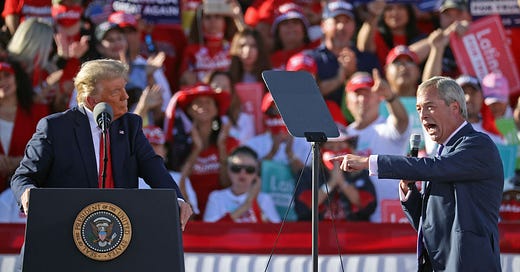This may seem like a premature question. Reform is leading the polls right now but we’re a long way from the next election. At this point in the last election cycle Boris Johnson looked invincible and most commentators thought Keir Starmer was one by-election loss away from resigning.
But it is now feasible that Reform could win. That’s not been true of Nigel Farage’s parties in the past. Until now they’ve always been tactical insurgents, wielding indirect power by threatening other parties and forcing them to change policy direction. Leaving the EU was the primary goal. Thus, in 2019, Farage chose not to stand Brexit Party candidates in seats held by Conservatives to ensure there was no second referendum.
Now Farage has no interest in saving the Tories and is trashing them at every opportunity. Reform’s new slogan is that only they can beat Labour. The goal is direct power.
And at local level, of course, they already have power, running ten councils and holding two mayoralties. Next year they will likely add more and are looking to come first or second in the elections for the Welsh Senedd.
Yet much media coverage about Reform still treats Farage and colleagues as insurgents looking to cause trouble for the main parties. There is very little coverage of what they’d actually do given the chance.
This suits them perfectly – allowing them to focus all their energy on attacking the government and the Conservatives rather than defending their own positions. It means they can paper over the inherent contradictions between different parts of their voter coalition. A billionaire businessmen in Mayfair and a hard-up single mum in Grimsby can both imagine Farage would govern in their interests.
So in this post I want to reframe Reform as a potential party of government. I’m going to start with their last manifesto and anything they’ve said about policy since the election. Then look at the start made by their elective representatives at local level.
Finally, I’ll look at how other radical right parties have adapted to government after winning elections, and propose that there are three types of governing styles Reform could adopt. None would be good but they would mean significantly different levels of risk to our economy and political system.
Reform’s policy agenda
Reform’s 2024 manifesto is a curious document. It combines mainstream policies (a social care commission, increasing defence spending to 3%), completely delusional promises with no explanation of how they’d be achieved (ending NHS waiting lists in two years, radical tax simplification), and properly batshit crankery.
Keep reading with a 7-day free trial
Subscribe to Comment is Freed to keep reading this post and get 7 days of free access to the full post archives.




